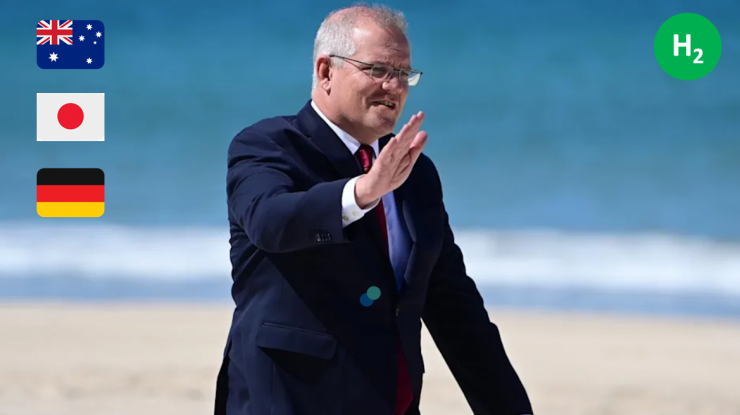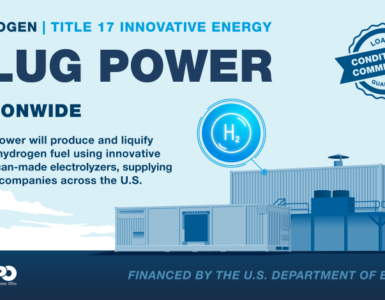Australia PM talks climate and hydrogen with Japan, Germany at G7.
Prime Minister Scott Morrison has discussed climate change with the leaders of Germany and Japan on the sides of a G7-plus summit, backing “ambitious action” while maintaining his line that net zero emissions should be achieved “as soon as possible” rather than giving a firm date.
German Chancellor Angela Merkel and Japanese Prime Minister Yoshihide Suga have committed their countries to move to to net zero emissions by 2045 and 2050 respectively.
Mr Morrison’s government said in a joint statement with Mr Suga, in language previously used by the prime minister.
🔥 What about we co-host a webinar? Let's educate, captivate, and convert the hydrogen economy!
Hydrogen Central is the global go-to online magazine for the hydrogen economy, we can help you host impactful webinars that become a global reference on your topic and are an evergreen source of leads. Click here to request more details
Australia reaffirms its commitment to achieve net zero emissions as soon as possible, preferably by 2050.
Mr Morrison, seated between Ms Merkel and Italian Prime Minister Mario Draghi, took part in a G7 session on climate and nature on Sunday that started off with a pre-recorded presentation by naturalist David Attenborough.
Earlier on Sunday, he announced that Australia and German had struck a deal to work together “to build a global hydrogen industry”.
“Our partnership with Germany will accelerate the development of an Australian hydrogen industry and create new jobs,” Mr Morrison said.
“Our ambition is to produce the cheapest clean hydrogen in the world, which will transform transport, mining, resources and manufacturing at home and overseas,” he added.
The accord builds on Australia looking to be a major hydrogen exporter and Germany holding expertise in hydrogen technology and planning to import significant quantities of hydrogen in the future.
READ the latest news shaping the hydrogen market at Hydrogen Central
Australia and Japan said in a statement they would commit to jointly support initiatives that will help drive the transitions to net zero emissions.
They vowed to “increase our joint focus on lower emissions LNG production, transport and use; clean fuel ammonia, clean hydrogen and derivatives produced from renewable energy or from fossil fuels with substantial carbon capture, utilisation and storage; carbon capture utilisation and storage; carbon recycling; and low emissions steel and iron ore”.
Mr Morrison is in Cornwall as a guest of leaders from some of the world’s richest countries and will have separate talks with host UK Prime Minister Boris Johnson early this week in London.
Earlier on Sunday, senior Labor frontbencher Penny Wong said Mr Morrison’s refusal to embrace net zero emissions by 2050 had left him isolated at the summit.
Senator Wong said she was disappointed the prime minister failed to secure a one-on-one meeting with US President Joe Biden.
Scott Morrison did get a meeting with Mr Biden on the sidelines of the G7 leaders meeting in the UK on Saturday but was unexpectedly joined by Mr Johnson.
Senator Wong said this was a disappointing result.
Mr Morrison’s stubborn refusal to sign up to net zero emissions has left him isolated and left Australia isolated.
Labor’s foreign affairs spokeswoman told reporters in Adelaide.
“I suggest Mr Morrison reflect on whether or not his stubborn refusal to sign up to net zero emissions along with so much of the rest of the world, is really delivering for Australia and for Australians.”
The UK is also host to a global climate change conference later this year in Glasgow.
Greens leader Adam Bandt believes the only reason why Mr Morrison was invited to the G7 meeting is so they can give him a dressing down over Australia’s inaction on climate change.
“Climate is a critical issue at this G7. It is the only game in town,” Mr Bandt told ABC’s Insiders program on Sunday.
“When they sit down to discuss climate, Scott Morrison will be sitting at the kids’ table and I think part of the reason he’s been invited to this summit is so the rest of the world can give Australia a dressing down on climate.”
Trade Minister Dan Tehan said Australia has put forward an alterative that would see a reduction on all tariffs when it comes to environmental goods and the freeing up of the movement environmental services.
Mr Tehan told Sky News’ Sunday Agenda program.
So that means all countries can get access to the technology they need to reduce emissions and the know how and expertise to be able to use that technology.
“We think that is a much more pro-trade approach.”
PM talks climate with Japan, Germany at G7, June 12, 2021








